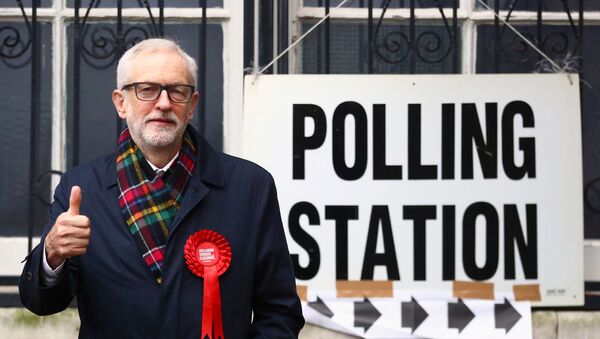With more on this story, Sputnik spoke to Professor Martin Smith of the University of York.
Sputnik: Jeremy Corbyn has said he will not lead Labour into the next election, following a "very disappointing night". With one seat left to declare, the party has won 203 seats - its worst result since 1935. How significant is this result and what does it mean for the party and opposition movements going forward?
Martin Smith: I think it puts the Labour Party in a very difficult position because I think what happened in this election is it's lost some of its core seats and I think the wider problem for the party and that I think the sort of Corbyn movement and the people around him who are sort of left-wing agenda that they were establishing was a way of attracting votes and it seems that this election not have done that.
I think the problem for the party is that there's no agreement where the party should go next. I think there's going to be a real battle between those who say Labour needs to shift back to the centre and those who are arguing that the problem was not Corbyn's message but that the election campaign got wrapped up in Brexit once that's out the way you can then carry on with Momentum and Corbyn approach and that's the way to another election. I think there's going to be a battle around why Labour lost and what the direction is for the future.
Sputnik: What were the reasons behind Labour’s defeat in this historic election?
Martin Smith: I think it's interesting that what happened in the election is that the Conservative vote didn't go up very much but Labour's went down a lot. I think Labour's went down for two main reasons. One was that they did clearly lose leave voters and leave constituencies so the fact their position on Brexit was unclear didn't actually help them and Johnson had another very clear message on Brexit, which got Brexit done. It wasn't quite clear what Labour's position was on Brexit.
I think the second reason is that there was a lot of opposition to Jeremy Corbyn's leadership and it can't have helped that throughout the election campaign there were people accusing him and the party of being anti-Semitic. I think that is obviously a difficult context into which you win an election. A third faction was although a lot of people agreed with the policies that Labour was pushing I think many were sceptical that they could realistically deliver all those policies in a single term of government.
Sputnik: Looking to the future do we have an indicator of which candidates in Labour could take over from Corbyn going forwards?




